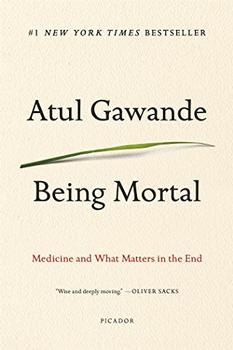Summary | Excerpt | Reading Guide | Discuss | Reviews | Beyond the Book | Readalikes | Genres & Themes | Author Bio

Medicine and What Matters in the End
by Atul Gawande
The late surgeon Sherwin Nuland, in his classic book How We Die, lamented, "The necessity of nature's final victory was expected and accepted in generations before our own. Doctors were far more willing to recognize the signs of defeat and far less arrogant about denying them." But as I ride down the runway of the twenty-first century, trained in the deployment of our awesome arsenal of technology, I wonder exactly what being less arrogant really means.
You become a doctor for what you imagine to be the satisfaction of the work, and that turns out to be the satisfaction of competence. It is a deep satisfaction very much like the one that a carpenter experiences in restoring a fragile antique chest or that a science teacher experiences in bringing a fifth grader to that sudden, mind-shifting recognition of what atoms are. It comes partly from being helpful to others. But it also comes from being technically skilled and able to solve difficult, intricate problems. Your competence gives you a secure sense of identity. For a clinician, therefore, nothing is more threatening to who you think you are than a patient with a problem you cannot solve.
There's no escaping the tragedy of life, which is that we are all aging from the day we are born. One may even come to understand and accept this fact. My dead and dying patients don't haunt my dreams anymore. But that's not the same as saying one knows how to cope with what cannot be mended. I am in a profession that has succeeded because of its ability to fix. If your problem is fixable, we know just what to do. But if it's not? The fact that we have had no adequate answers to this question is troubling and has caused callousness, inhumanity, and extraordinary suffering.
This experiment of making mortality a medical experience is just decades old. It is young. And the evidence is it is failing.
this is a book about the modern experience of mortality— about what it's like to be creatures who age and die, how medicine has changed the experience and how it hasn't, where our ideas about how to deal with our finitude have got the reality wrong. As I pass a decade in surgical practice and become middleaged myself, I find that neither I nor my patients find our current state tolerable. But I have also found it unclear what the answers should be, or even whether any adequate ones are possible. I have the writer's and scientist's faith, however, that by pulling back the veil and peering in close, a person can make sense of what is most confusing or strange or disturbing.
You don't have to spend much time with the elderly or those with terminal illness to see how often medicine fails the people it is supposed to help. The waning days of our lives are given over to treatments that addle our brains and sap our bodies for a sliver's chance of benefit. They are spent in institutions—nursing homes and intensive care units—where regimented, anonymous routines cut us off from all the things that matter to us in life. Our reluctance to honestly examine the experience of aging and dying has increased the harm we inflict on people and denied them the basic comforts they most need. Lacking a coherent view of how people might live successfully all the way to their very end, we have allowed our fates to be controlled by the imperatives of medicine, technology, and strangers.
I wrote this book in the hope of understanding what has happened. Mortality can be a treacherous subject. Some will be alarmed by the prospect of a doctor's writing about the inevitability of decline and death. For many, such talk, however carefully framed, raises the specter of a society readying itself to sacrifice its sick and aged. But what if the sick and aged are already being sacrificed—victims of our refusal to accept the inexorability of our life cycle? And what if there are better approaches, right in front of our eyes, waiting to be recognized?
Excerpted from Being Mortal by Atul Gawande. Copyright © 2014 by Atul Gawande. Excerpted by permission of Metropolitan Books. All rights reserved. No part of this excerpt may be reproduced or reprinted without permission in writing from the publisher.
What really knocks me out is a book that, when you're all done reading, you wish the author that wrote it was a ...
Click Here to find out who said this, as well as discovering other famous literary quotes!
Your guide toexceptional books
BookBrowse seeks out and recommends the best in contemporary fiction and nonfiction—books that not only engage and entertain but also deepen our understanding of ourselves and the world around us.